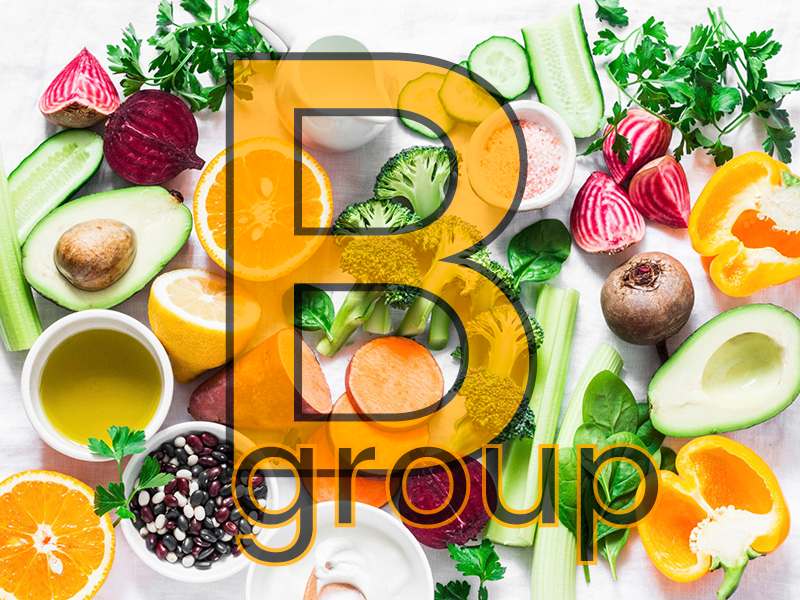Your one-stop source to the B’s
Have you ever wondered why more and more products at the grocery store are advertising something like ‘one serving provides your entire daily dose of vitamin B’s’? This specific group of vitamins has gained a lot of attention over the last decade, but even so, many people do not understand what they are and why they are so crucial to the diet.
What are B’ Vitamins
B vitamins comprise important nutrients that are all chemically related and work together to help the body receive their benefits. Some provide an energy boost, some help cells burn fats, and others repair damaged cells. They are necessary for human growth and development, even in adulthood.
Most of the population does not get enough B vitamins, especially folic acid, B12 and B6. As with any other deficiency, a lack of vitamin B’s can cause the body to function improperly, causing the individual to become more susceptible to illness and disease.
Evaluating Main B’s
The B’s are composed of several chemical compounds; however, the following 8 are the most important:
B1 -Thiamine
Thiamine is important in that it helps to convert ingested food into energy. It also helps to metabolize protein and is necessary to maintain a healthy functioning nervous system. It is believed that Vitamin B1 can help those with Alzheimer’s, epilepsy or anyone with a mental disorder. A B1 deficiency can cause malaise, muscle tenderness, constipation, pins and needle sensation and can lead to Beriberi, a life-threatening disease.
Foods sources of thiamine: watermelon, asparagus, tuna, sunflower seeds, flax seeds, black beans
B2 – Riboflavin
Riboflavin helps the body to metabolize carbs, fats and proteins. It also helps to generate the enzyme, glutathione, which eliminates free radicals from the body. It can help persons suffering from migraines, prevent cataracts and increase iron levels in those suffering from anemia. A deficiency of B2 can cause cracked lips, mouth ulcers, a sore throat, dry skin, itchy or bloodshot eyes and sensitivity to light.
Foods sources of riboflavin: okra, persimmons, bananas, fish, dairy, dark leafy greens
B3- Niacin
Niacin works with other B vitamins to help metabolize food while providing an adequate amount of energy for the body. B3 can help to reduce high cholesterol levels and reduce the risk for cardiovascular disorders. A niacin deficiency can cause skin problems, muscle weakness, fatigue and loss of appetite.
Foods sources of niacin: meat, fish, peanuts, shitake mushrooms, mango, passion fruit
B5 – Pantothenic Acid
Pantothenic acid helps the body turn carbohydrates, fats and proteins into energy. It also supports the adrenal gland by producing hormones that can alleviate stress and depression. It can benefit individuals with rheumatoid arthritis or high stress. A deficiency, although very rare, can cause lethargy weakness and numbing sensations.
Foods sources of pantothenic acid: avocado, yogurt, crimini and shiitake mushrooms, broccoli, guava
B6 – Pyridoxine
Three different chemicals comprise B6; these being, pyridoxine, pyridoxamine and pyridoxal; all three of the chemicals have the same effect on the body. B6 plays an important role in various body functions. It can help to break down sugars and starches, synthesize amino acids and proteins and keep the nervous system healthy. Vitamin B6 is effective at preventing or aiding in the cure of over 100 different medical ailments. A deficiency in this compound can lead to anemia, fatigue, eczema and in serious cases, seizures.
Foods sources of pyridoxine: brown rice, pistachios, garlic, bell peppers, squash, shiitake mushrooms
B7 – Biotin
Biotin is necessary for cell growth, the production of fatty acids and maintaining healthy blood sugar levels. It is especially beneficial for diabetics and people with brittle nails and hair loss. A vitamin B7 deficiency can lead to cradle cap in infants, poor muscle tone and cramping.
Foods sources of biotin: swiss chard, almonds, peanuts, halibut
B9 – Folate
Folate, or folic acid, is a B vitamin that supports red blood and skin cell production, allows nerves to correctly function and helps to prevent birth defects. It is especially beneficial for women in that it aids in a healthy pregnancy, helps to prevent cervical cancer and reduce osteoporosis. A folate deficiency can cause brain impairments in growing fetuses, fatigue, impairment, depression, confusion and insomnia.
Foods sources of folate: spinach, asparagus, lentils, pinto beans, beets, broccoli, papaya, dates
B12 – Cyanocobalamin
B12 helps to produce red blood cells while managing the development of healthy nerve cells. It also is crucial in the metabolizing process of proteins, carbs, and fats. It can help to lower cholesterol levels, protect against cancer, prevent strokes and improve poor skin conditions. Oftentimes, vegetarians, alcoholics, the elderly and pregnant women suffer from a minor vitamin B12 deficiency. This can lead to illnesses like fatigue, constipation, muscle weakness, weight loss, poor memory, vision problems and a low sperm count.
Foods sources of B12: meats, seafood, cheese, nutritional yeast
Natural Dietary Supplements Containing Vitamin B’s
Some people do not have access to food items high in the B vitamins. This could be due to their geographic location or cost of the product. Furthermore, those with a specialized diet may be unwilling to consume certain foods rich in vitamin B’s. Both of these circumstances could leave a person at risk for developing potentially harmful deficiencies. There are, however, natural dietary supplements which can provide adequate amounts of vitamins B’s. These include:
• Moringa (Super Multi-Vitamin)
• Spirulina (Complete Protein Plus B1, B2, B6, B12)
• Amala Berry (Super Vitamin C and High B)
• Burdock
• Alfalfa
If you would like more information about wellness and our detox, weight loss packages please contact us or visit the wellness programs page.
